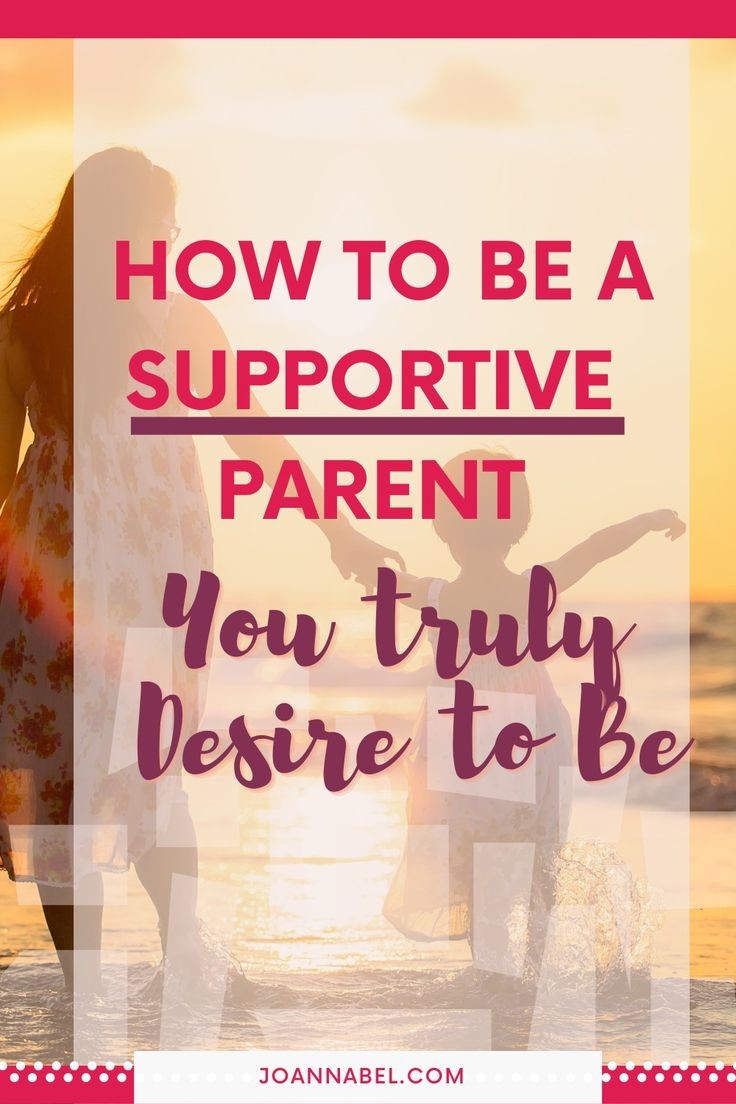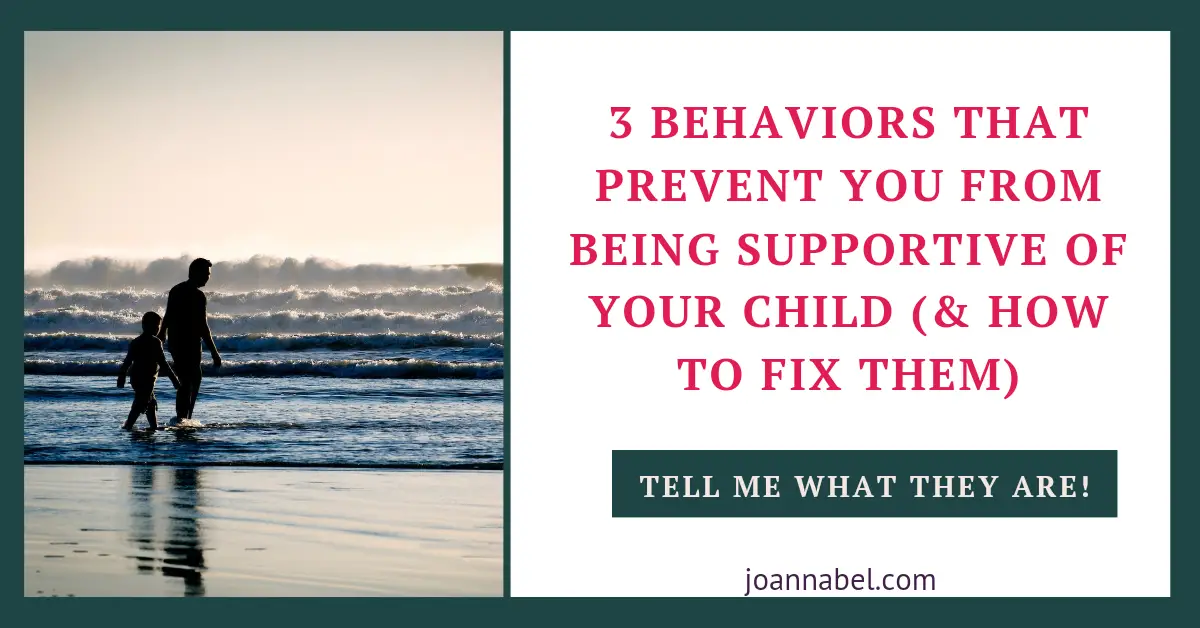I know you want to be an emotionally supportive parent even when you’re not skilled enough to do it as you’d like. I believe every parent would like to be considered emotionally supportive, but unfortunately that’s not always the case. You have your experience that tells you this, right?

How To Be An Emotionally Supportive Parent
But what’s more important, is a parent’s motivation and readiness to learn how to do better! To become the supportive parent they truly want to be.
Often we’re not equipped with the right resources, or we didn’t have an ideal role model, or simply, the level of awareness in the society we have lived in hasn’t been very high until this moment in time.
And it’s a good thing that we now know how important is to show support to people around us.
And, luckily, there are some principles we can begin to stick to from now on, to become just as supportive as parents we aim to be!
So let’s talk about them, so you can start benefitting from them straight away!
In this post, I’ll provide 6 tips that can help you, and I recommend that you focus your attention on implementing them in your situation.
But first, let’s mention how to recognize if you’re (not) being supportive in the first place.
Note: Although I am a Clinical Social Worker, engaging with this website does not establish a professional social worker-client relationship. The information provided here is for general purposes only and should not be considered professional advice. While we strive to ensure accuracy and reliability, this content is not a substitute for professional guidance. For specific concerns, issues, or situations, it is essential to consult a qualified professional and present your situation. Read the full Disclaimer here.
HOW TO BE AN EMOTIONALLY SUPPORTIVE PARENT

SIGNS THAT YOU SHOULD START BEING MORE SUPPORTIVE AS A PARENT
Oftentimes, we don’t provide enough support because we’re being too protective of children and we believe that if we can prevent any hurt, pain, or suffering than their life will be great and we’ve done a good job.
Because of this thought error, we put high criteria on them for success (we don’t let mistakes occur), so they are not even trying until they’re certain they will “win”.
But with this, we’re doing them deservice, because we’re not giving them the opportunity to build their skills to deal with challenges and difficulties that are inevitably going to come.
Sometimes, for one reason or another, we’re not that skilled to provide support so we can’t really respond to child’s needs in the optimal way.
Still, all of this can improve once we make a decision that we’re ready for a change and we stick to it.
Let’s see what are the signs that you’re not being supportive enough in your parenting:
- You can’t restrain yourself from being critisizing
- You’re punishing them when they make a mistake
- You’re invalidating them when they fail
- You see them through the prism of how successful and overachieving they are
- You’re being very strict with them
- You’re being vindictive with them instead of offering learning opportunities
- You’re denying them connection when they can’t learn fast enough
- You’re being kind and connect with them only when they match your expectations (perfectly)
- You’re imposing perfection
- You’re always ignoring their wishes (hardly ever considering them)
- You’re denying them the right to make choices
- You’re not giving a feedback and praising their efforts
- You don’t let them be themselves (who they really are)
- You’re not giving them an opportunity to express themselves
- You’re ignoring their perspective
- You don’t let them negotiate
- You’re denying them power
- You’re always trying to do things for them (prevents growth of independence)
- You treat them as irrational and incompetent.
If you want to dig into each of them, go read my post that covers all 19 signs unsuportive parents show.
Now that you had the chance to reflect on your situation, which I strongly suggest that you do, we can move on to the tips that can help you become more supportive. Or simply estimate how supportive you are of your children.
They’re not numbered by order of importance.
1. BE ENCOURAGING AND RECOGNIZE THEIR EFFORTS
If they didn’t succeed the first, second, or five times, that doesn’t mean they won’t.
So instead of expressing dissatisfaction with their progress, you should encourage them to proceed until they succeed.
The problem is that they can comprehend that you’re dissatisfied with them, which can invalidate them and affect their confidence to keep trying.
It can be hard to be patient at times.
Especially because you’re short on time, but still, if you want to help them, for instance, to learn a skill, they will achieve this faster if you praise their efforts.
At the same time, going down this path will help them develop a tolerance for frustration because things aren’t going as planned.
They will learn that it takes some time to achieve a breakthrough, and build their resilience for dealing with challenges in life.
2. AVOID HARSH CRITICISM
It’s not about them not failing, it’s about not giving up easily, so if you shift your mindset around that, you won’t have a problem with excessive criticizing.
And that’s because you’ll be less likely to indulge in criticism with such a mindset.
This suggests that you shouldn’t try to (over)protect them from any failure in life.
If you keep sending messages, such as: I told you that you wouldn’t be able to do it, or if you keep frightening them by projecting your fears onto them, they’ll struggle to make real progress.
First of all, we all learn from our own experience and mistakes the most. The same goes for them.
Secondly, it’s not about avoiding fear and not acting despite the fear, it’s the opposite.
Fears are meant to be understood and, hopefully, overcame.
Finally, it’s not about perfection, it’s about creation and freedom of choice.
If you teach them to focus on being perfect, they won’t be themselves, because true authenticity doesn’t come from fitting into the standards of others.
It’s about finding their own way in life, expressing themselves creatively, and finding their true purpose.
Constructive criticism has its place, but constant criticizing, besides being really hurtful, is not about their needs. But it can tell you something about you and maybe about your needs that you need to think about more than you do already.
You should check out also:
LIVE Q&A And Consultations with Jovana (WISHLIST)
Want a chance to get included in live weekly calls with me and get access to my expert insights, advice, recommendations, and guidance for your unique situation?
Consider signing up if you are aiming for:
- achieving tremendous child-parent relationships with the least effort possible as you learn what to focus your attention to
- attuning to healthy child development practices without losing yourself in the process and ignoring your human needs, rights, and aspirations for your life
- understanding and responding to your and your child’s needs better and carefully easing the tension between the two
- having your most pressing questions and concerns addressed and ongoing support
- getting skilled in honoring the child’s best interest in each life situation with the help of a few key rules and principles (child wellbeing, independence, autonomy, participation, and equality)
- experiencing a supportive and cooperative relationship with the other parent or a co-parent even in high-conflict circumstances
Address your doubts, concerns, and challenges, but also reflect on your situation through the experiences of others in this small and supportive community.
You’ll unlock monthly access for 60% off of my current hourly rate!
3. BE GENTLE, WARM, AND KIND
Kindness and firmness can go together because you do need to provide limitations, but it won’t work without the flexibility that lets them function inside the existing boundaries.
Some parents might get caught up in confusion about whether it’s alright to be kind and firm with children at the same time, or even if it’s possible to do so. Or they’re not sure how to do it.
You shouldn’t fear that kindness will spoil your kids, but you need to set limitations just as much as you need to be gentle.
What can lead to defiance is often a lack of consistency in providing disciplinary measures once we spot inadequate behavior and qualify it as antisocial, and in setting limitations.
Here, discipline isn’t to be understood in terms of only punishments, and it’s never about corporal punishment, which is to be avoided at all times because it’s disrespectful to kids’ integrity.
So it’s OK to be firm. But be firm with your requests while still remaining kind to your child.
This is essential because we’re not trying to suggest something is wrong with them.
We’re helping them learn socially acceptable behavior.
Also, remember that support does come from having their side, but having their side doesn’t mean supporting their wrongdoing in their interactions with others.
Read also:
4. EMPOWER THEM
It’s not about the problem, struggle, or challenge. It’s about our attitude and what we’re focused on in these situations.
So it’s not about trying to prevent any problems in life. Besides the fact that this is impossible, what’s more important is to understand that our focus shouldn’t be on the fact that we have it in the first place, or on the problem itself.
It’s about focusing on our strengths to overcome any situation we are facing.
Before we get into a spiral of disempowering thoughts, it’s critical that we make an effort to detect what is in our arsenal for responding to this problem.
I’m not saying avoid emotions that follow the problem, because that wouldn’t be useful and it’s unnecessary.
I’m saying, move from convincing yourself you’re powerless to recognizing your strengths that are most important here.
If you learn how to empower yourself, it’ll be much easier to pass it on to your child.
Or simply start learning and growing together right now.
5. VALUE AND RESPECT INDIVIDUALITY AND DIVERSITY
I know you really want your child to have it all, but sometimes, or oftentimes, your “all” is not their all.
Here, it’s important to remember that kids are sovereign just like you are, and they are entitled to make their own choices and manage their own lives.
This doesn’t mean they don’t need you as their guide and protector.
It simply means that you shouldn’t keep making choices on their behalf and without including them.
It’s OK for them to be completely different from you, and if you really want to show respect, you’ll need to make sure you accept this.
Disrespect or endangering of someone else’s individuality and different life choices comes from forgetting to observe them separately from our own existence and needs.
Additionally, for parents, it can come from the urge to protect children. And sometimes parents can be protective even when this is not in the child’s best interest.
Related:
6. ACKNOWLEDGE AND INCLUDE THEIR POINT OF VIEW AND PERSPECTIVE
It’s important to create a habit of including the child’s perspective from the get-go. This means that, as a parent, you need to have their perspective in mind when making decisions that affect them and include them in the conversation.
It’s not about sharing responsibility (as in overburdening them with responsibility). It’s about sharing power.
Sharing power suits their needs because it gives them a sense of control over things that are happening around them and protects them from feeling powerless in their lives.
Obviously, at times, you’ll have to go against what they would like the most to happen, and they can’t always know the best way to go.
But even when it is so, they should have a say and their opinion should be acknowledged.
This way, you’re sending a message that you’re equals, that you all deserve to be respected and have your voices equally appreciated.
Children can form an opinion on things that affect their lives and can participate in decision-making if you put effort into providing them with enough information and when you create conditions that support them to do so.
If you found the information on the blog helpful & inspirational and you feel like giving back, you can do it by clicking the donate button after entering amount you’re comfortable with. I’ll use it to create and deliver more useful content and resources like this. Thanks for your precious contribution!
Latest Posts:
- A Guide to Balancing Parenting Roles After Divorce

- Gifts for Your Teenager That They’ll Actually Enjoy

- 6 Reasons Your Teenagers Seem Distant and Distracted

- Special Gifts to Let Someone Know You’re Thinking of Them (13)

- 100 Ways to Challenge Yourself (Without Stretching Yourself Too Thin)

- What To Do When Your Parent Struggles With Alcohol

FINAL THOUGHTS ON HOW TO BE AN EMOTIONALLY SUPPORTIVE PARENT
These were the most important tips on how to be an emotionally supportive parent. I hope you find it helpful and that you’ve managed to get insights on how much support you provide for your child or children.
If you have, feel free to share them in the comments!
See you in the next post! Here is one:










Leave a Reply